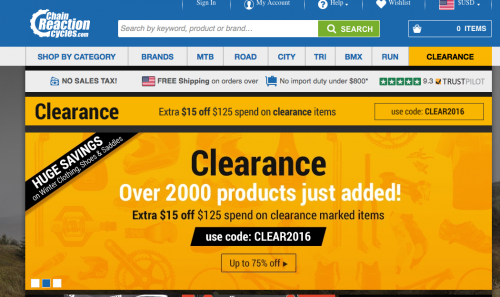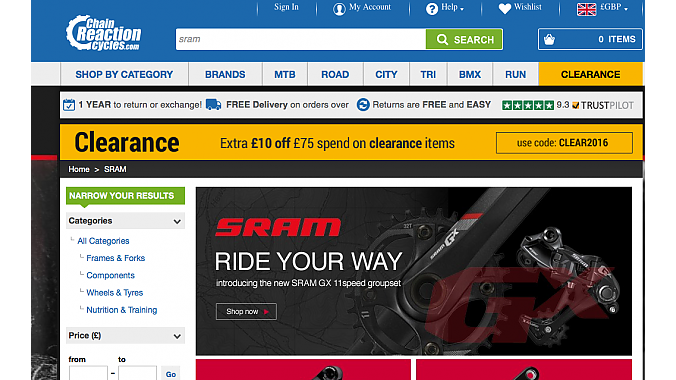COLORADO SPRINGS, Colo. (BRAIN) — U.S. visitors to European-based e-commerce sites like Wiggle and Chain Reaction have seen something new when they searched for SRAM products in recent months: nothing.
The Chicago-based brand has developed policies that prevent those and some other offshore sites from selling into the U.S. market as part of an overall strategy to maintain consistent retail pricing worldwide and help brick-and-mortar retailers get better margins on aftermarket sales of SRAM products, including SRAM, Avid, RockShox and Truvativ branded items.
Wiggle and Chain Reaction continue to sell SRAM products to European web shoppers, generally at full retail prices. U.S.-based websites also continue to sell SRAM, but are required by SRAM's minimum advertised price policy to advertise full retail pricing.
Jason West said reining in aftermarket pricing has been a priority at least since he took over as vice president of aftermarket and retail sales in 2011. West has worked for SRAM in various roles for more than 20 years.
"We do care about where our products are positioned in the marketplace; that's an important part of who we are," West told BRAIN in a recent interview. "The IBD channel should earn a reasonable margin because there is certainly a value added there."
West said SRAM has been able to take control of its international pricing in part by policing for counterfeit products and preventing bicycle factories from selling excess OEM products in the aftermarket. SRAM communicates to the bike factories that such gray market distribution is unacceptable. When it finds OE products being sold in the aftermarket, it can trace them back to their source through serial codes and other methods. When orders come in from factories, SRAM can simply eyeball them to see if they look to be legitimate OE orders, he said.
"We know what (bike) brands each factory makes, and, for example if we see an order come in for a bunch of (RockShox) Pike forks, and we don't see that any of that factory's brands are spec'ing a bike with that fork, we'll start asking questions. We have turned away orders if they don't look right."
West said SRAM has an easier time than some of its competitors in policing the gray market in part because SRAM has long had a build-to-order strategy. Its factories build what is needed to fill orders and little more, so there is little excess inventory that needs to be unloaded.
In the U.S., many suppliers use MAP policies in an effort to prevent discounting. However, such policies are generally illegal in Europe. Under certain conditions, the EU does allow vendors to restrict its customers to selling into specific regional markets.
"We have made policy changes that keep European sales in Europe for any of the retailers that conduct more than 90 percent of their SRAM business online," he said.
West emphasized that SRAM is not opposed to e-commerce.
"Consumers are taking a more powerful position in the marketplace, and we need to have a presence online."
"As you can imagine, the response from dealers in the U.S. is very positive to this move," he said. "That said, we have positive relationships with many of the European sites, and they can be important customers of ours — in Europe."




